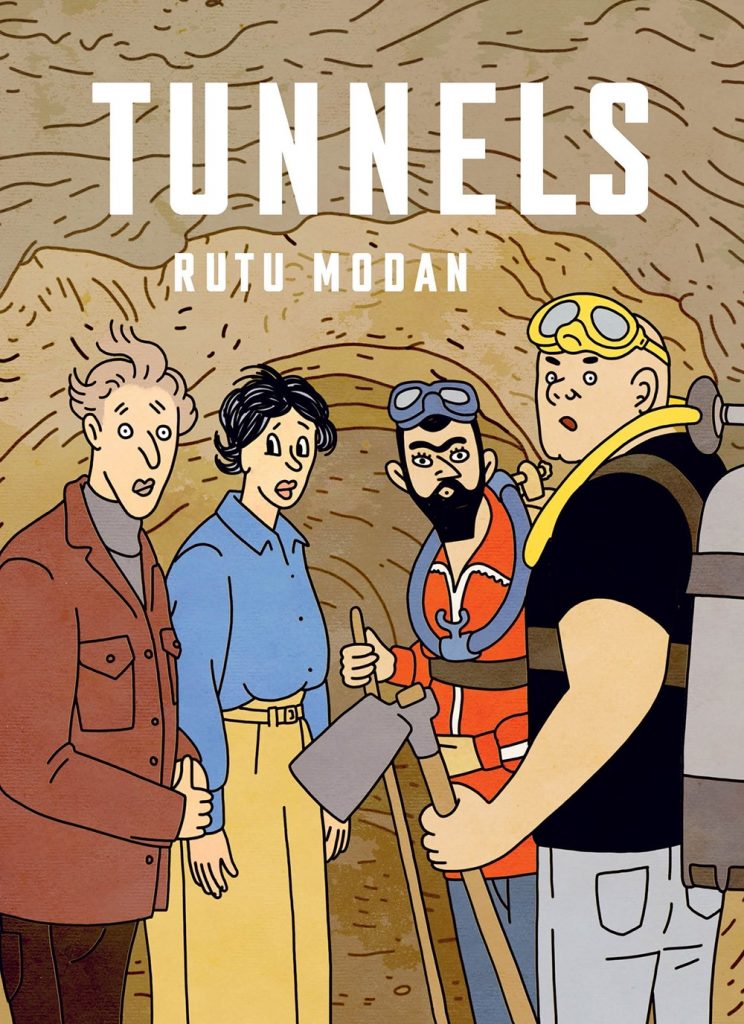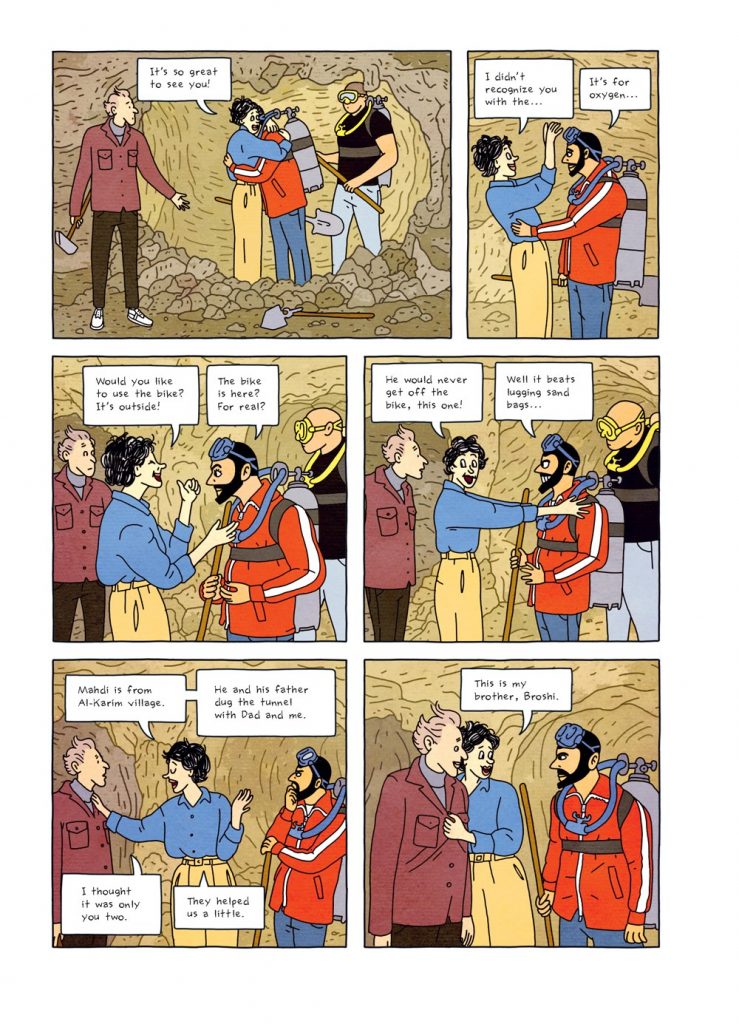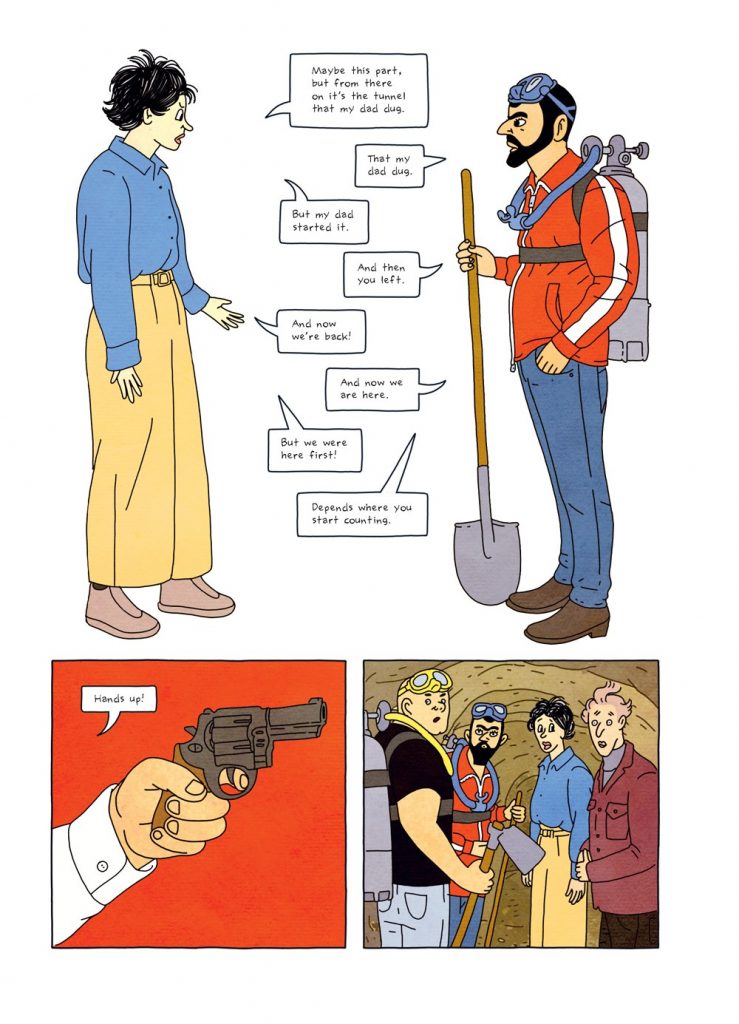
Rutu Modan’s graphic novel tells the story of Nili, the daughter of an archaeologist who was denied tenure and is now suffering from Alzheimer’s. When Nili was younger, she helped her father dig a tunnel he believed would lead to the Arc of the Covenant. Now, as an adult, she has discovered a piece of text that rekindles her interest, leading her to try to find it once again.
However, much has changed since that original dig, especially in the Israeli-Palestinian relationship. The original tunnel is now on the Palestinian side of the Barrier (or Separation Wall), and getting access to the original tunnel is difficult. Nili’s plan is to dig underneath the wall, connect to the original tunnel, and proceed from there. During that process, they find other diggers, Palestinians whose parents helped her father.
Modan uses these interactions with Palestinians and the arguments about who has the rightful claim on the tunnels as a metaphor for differing interpretations of the land overall. Various Israeli characters hope to find the Arc to bring back what they see as the glory of Israel, whether that’s religious, through the coming of the Messiah, or political, as the land would become sacred ground for Israel, giving them another reason to move the Palestinians. The Palestinians are digging to create a tunnel for smuggling vegetables, as they are merely trying to survive an awful situation. In the same way people are fighting for land and survival above ground, they do the same below.

Modan also shows discord within families and between friends, as the characters have different motives and goals, and they don’t trust each other. Broshi, Nili’s brother, is working for the archaeologist who ruined their father’s career. Abuloff, the financier behind the dig, is only interested in the money he could make by selling the Arc. His wife has begun selling his artifacts, angered by his most recent purchase: a statue he bought from ISIS, helping to fund their terrorism. Gedanken is a true believer in the Messiah, believing the Arc will restore the reign of David. Much of his dialogue comes from quotes from rabbis or the Tanakh, the Jewish Bible; however, he also misleads almost every character he interacts with, doing whatever he needs to in order to get what they need for the dig. The two Palestinians, Mahdi and Zuzu, are also more than they seem. When the tunnelers find a hideout of a former Palestinian military leader, Mahdi dresses in his outfit, a choice that leads to a significant accident near the end of the book. He also has a brief romantic affair with Broshi, but that isn’t developed.
The characters bicker constantly, often plotting behind each other’s backs. Gedanken doesn’t trust the Palestinians, though they do much of the work and help the dig proceed more quickly and easily. Rafi Sarid, the professor Broshi works for, manipulates Broshi and then Doctor, Nili’s young son, to try to get credit for the discovery of the Arc. These fights between Israelis, as well as the conflict between them and the Palestinians, reflect the ongoing conflict in the Middle East. Nobody trusts each other in Tunnels, ultimately leading to their missing the most important development in the book. Modan isn’t writing to give readers hope, ending on a rather pessimistic note, but she does give readers another way of seeing the problems that exist.

Modan’s artistic style is largely bright and realistic, though she does veer into exaggeration at times. One of the best moments is when Nili receives some awful news and begins crying. Modan has small waterfalls coming out of Nili’s eyes to reflect the emotional anguish she’s enduring. Similarly, when characters tell stories from the past, Modan will adjust her style to fit the time, such as when she mimics a more pictographic style to convey the Babylonian siege of Jerusalem.
Tunnels is well-paced and well-drawn, guiding the reader through a story of characters who are only focused on their individual goals. Such an approach works well to represent the seemingly intractable problems in the Middle East between and within factions that can’t find ways to live together.
SOLRAD is made possible by the generous donations of readers like you. Support our Patreon campaign, or make a tax-deductible donation to our publisher, Fieldmouse Press, today.

Leave a Reply